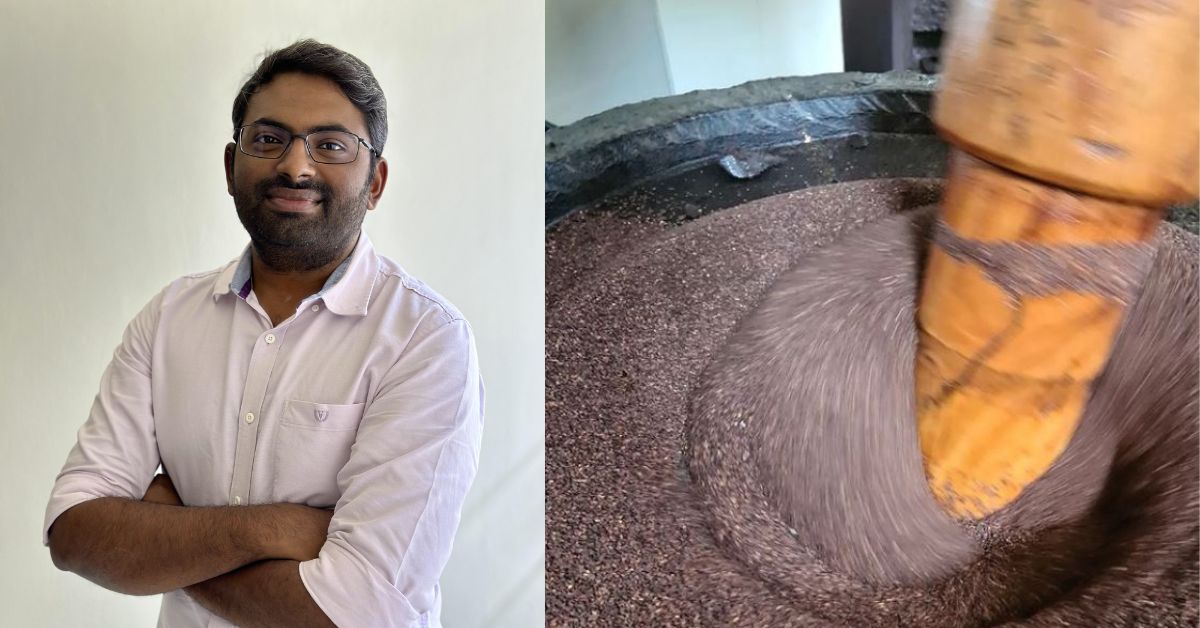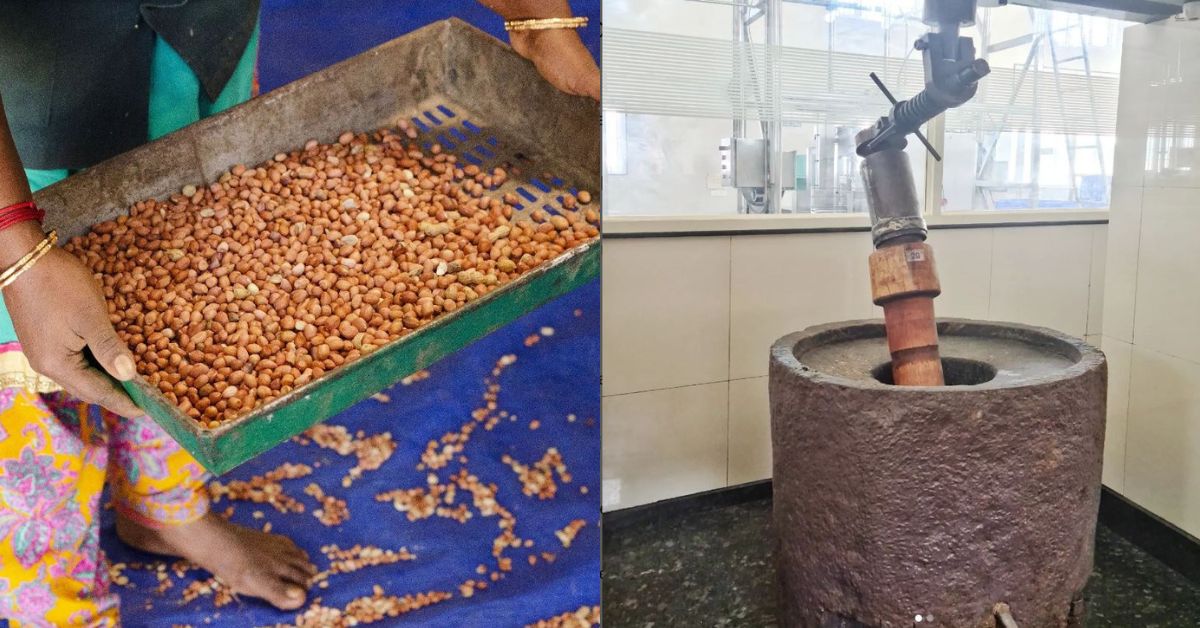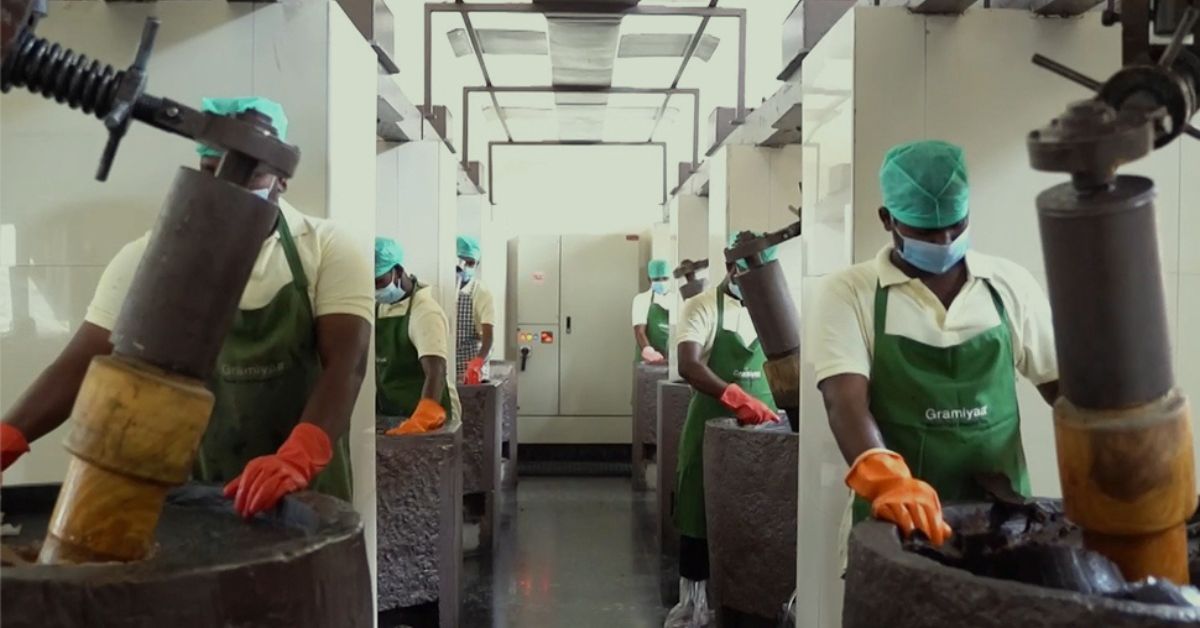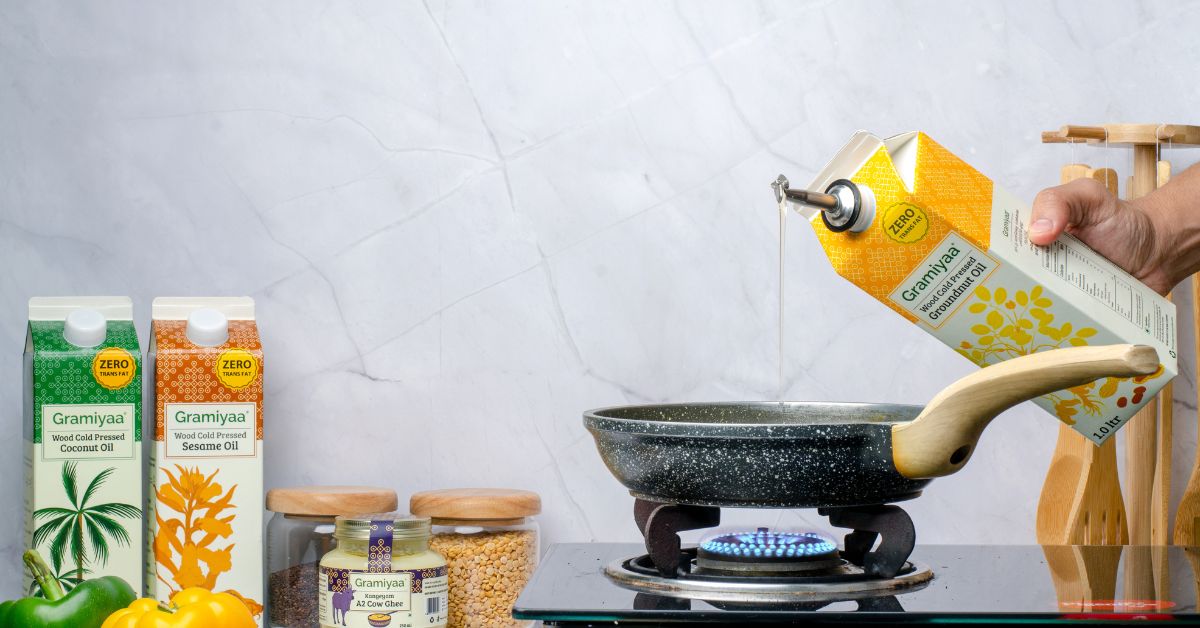Engineer Turns Grandpa’s Old Shop into Multi-Crore Biz, Revives Wood Cold-Pressed Oils
Sibi Manivannan runs Gramiyaa, a spin on his grandfather’s old village shop, which sells wood cold-pressed oils across the world to reintroduce them in Indian kitchens.

In his childhood, Tamil Nadu’s Sibi Manivannan would relish the dosas his mother cooked, and even today, at 30, remembers the exact aroma and taste of the dish.
The secret to this, he says, were the oils used in their making.
“When my mother would heat groundnut or sesame oil, the whole house would fill up with the aroma,” he says in conversation with The Better India.
“You heat one dosa made with sesame oil, and the other cooked with refined oil, and you will feel the difference between the two. It also tastes better and has more essence to it,” the Trichy resident says.
Sibi considers himself fortunate, as it was his grandfather who prepared these wood cold-pressed oils using traditional stone mills. “My grandfather used to do this work back in the 1960s in a very small setup in our village. Unfortunately, he had to shut the business in the ‘90s, when refined oils came into the picture. I wanted to revive the work,” he adds.

So as an ode to his beloved thatha and to offer a healthier alternative to refined oils, he started Gramiyaa in 2017 with college friends Mohamed Yaseen and Naveen Rajamaran. The trio sells at least 50,000 litres of minimally processed cold-pressed oils every month.
Bringing wood-pressed oil back
After completing his graduation in robotics and automation in 2015, Sibi got into the family business of automobile dealerships and running restaurants. It was when he wanted to purchase oils in bulk for his restaurant business that he realised the heavy usage of chemical solvents and adulterations in them.
“We saw how oils were adulterated with cheaper palm oil and cotton seed oil. That is when I remembered how my thatha used to make good-quality oils in a stone mill. These were minimally processed, preservative-free, and flavourful as well. I missed the memories and wanted to revive the business for good,” he says.
Explaining how the oils are manufactured at Gramiyaa, Yaseen tells The Better India, “First, we get only low moisture seeds from Tamil Nadu, Rajasthan, and Kerala. Usually, companies get cheaper seeds with more moisture content and roast them before extraction. We do not roast to retain the flavour and instead sun-dry the seeds for a day.”

“Thereafter, oil is extracted from these seeds on a stone mill with a wooden pestle. Usually, during the refined oil processing, the hydrogenation temperatures go up to 200 degree Celsius. While this is done to increase the shelf life of oils, the process also yields trans fats, which severely increase cardiovascular risks,” he explains.
A 2022 study by the International Journal of Food and Nutritional Sciences reveals that because of this procedure, the seeds are stripped of all naturally occurring nutrients and antioxidants, resulting in a final product that is devoid of flavour and offers no positive effects on our health.
“We just crush seeds hard enough to bring as much oil and leave the rest. We make sure that we do not exceed 50 degrees Celsius. For us, it does come up with a cost as our extraction percentages are low. But that is how our oils get better in aroma and health,” says Yaseen.
After the extraction process, oil is passed through a cotton filter system to remove seed sediments from the oil. Lastly, the cold-pressed oils are packaged in opaque gable-top paperboard cartons. “Our opaque packaging unlike PET and glass bottles keep the oil fresh for a long time and prevents rancidity that is caused by exposure to sunlight,” he adds.

A win-win for all
The trio produces about 50,000 litres of cold-pressed oils in three categories – groundnut, sesame, and coconut oil priced at Rs 390, Rs 590, and Rs 420, respectively.
“Our products are premium. But they have a thicker consistency and because of this, they get absorbed less in food, especially when you are deep frying. This ensures that people consume less oil. Our 4-litre combo usually lasts longer than a 5-litre refined oil packet,” says Yaseen.
So far, they have sold their oils to at least 30,000 customers and helped them replace refined oils in their kitchens. Mumbai’s Prachi Ghugare has been using their cold-pressed groundnut oil for about a year-and-a-half. She tells The Better India, “The vegetables taste better now. I can feel that the food is cooked in authentic oil. If I forget to order and cook food in any other regular oil, then my son easily figures it out.”

“Although nobody in my family has any history of high cholesterol levels, I did not want to feed my husband and son food cooked in refined oils,” adds the 39-year-old software engineer.
With Gramiyaa, the trio clocks a monthly revenue of Rs 1 crore. Yaseen says 50 percent of the revenue comes from exports to countries like the USA and Canada. If you found our stories insightful, informative, or even just enjoyable, we invite you to consider making a voluntary payment to support the work we do at The Better India. Your contribution helps us continue producing quality content that educates, inspires, and drives positive change. Choose one of the payment options below for your contribution- By paying for the stories you value, you directly contribute to sustaining our efforts focused on making a difference in the world. Together, let’s ensure that impactful stories continue to be told and shared, enriching lives and communities alike. Thank you for your support. Here are some frequently asked questions you might find helpful to know why you are contributing?

For Sibi, the business is a win-win situation. “On the one hand, we have very happy customers. Seventy-five percent of our customers regularly repeat their orders. On the other hand, I am able to pursue my passion and do what I like. We were able to replicate the entire processing units the way my grandfather used to do. Unfortunately, he is not there with us, but he would have been happy to see that we are able to take these oils to so many kitchens like once he did,” he says.
Source:
A review on wood pressed edible oils: Published by ACS College, Maharashtra in the International Journal of Food and Nutritional Sciences in December 2022.
Edited by Divya Sethu; All photos: Gramiyaa.
This story made me
-
97
-
121
-
89
-
167












